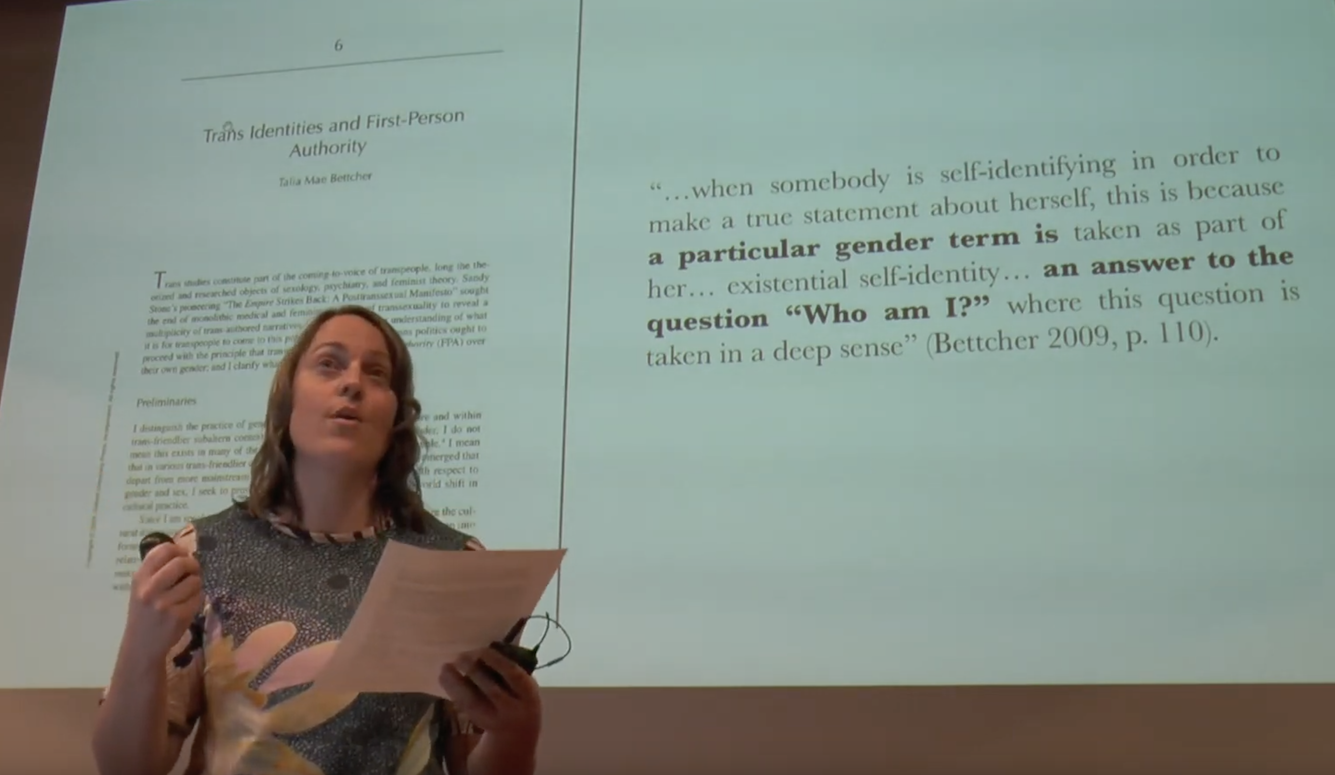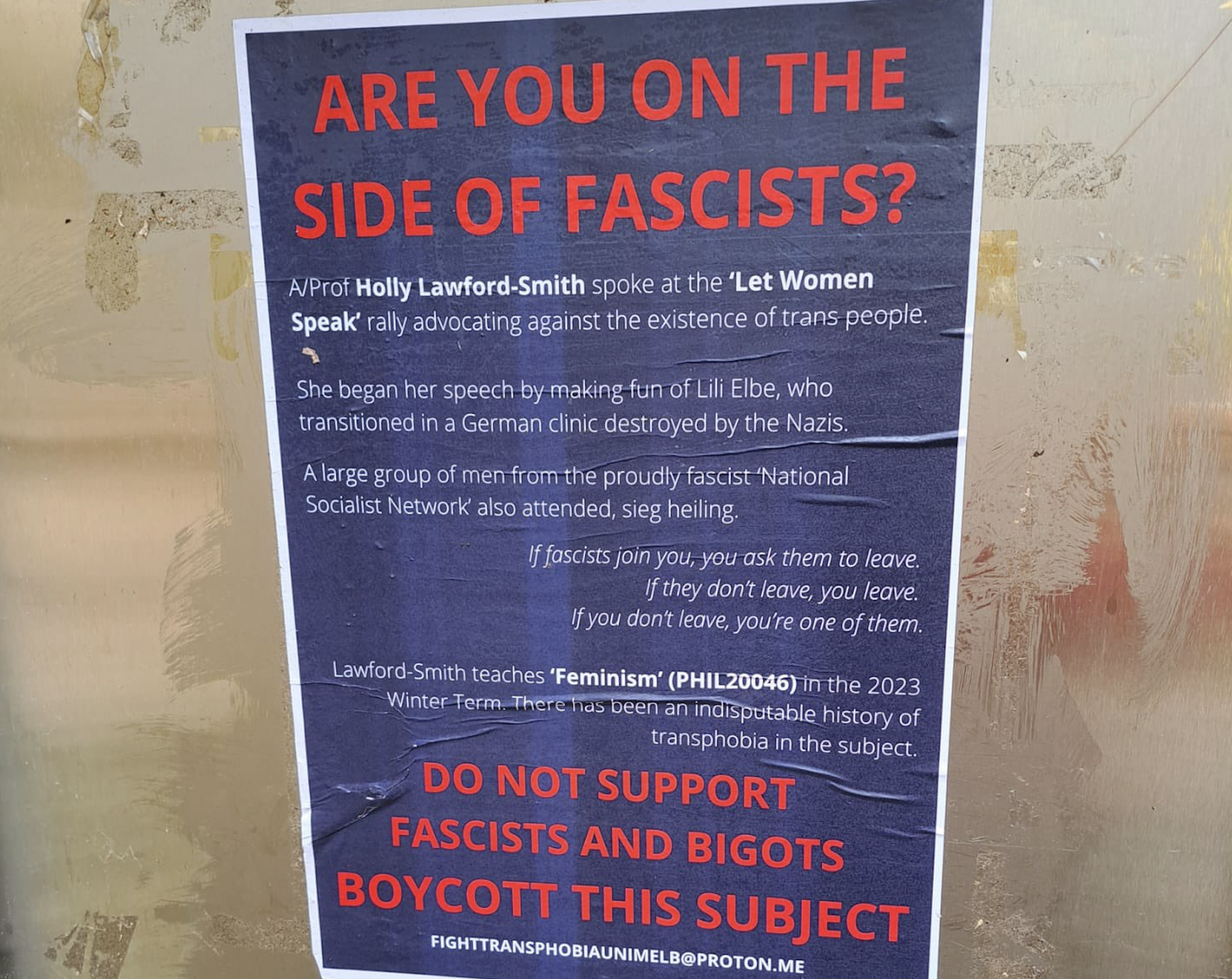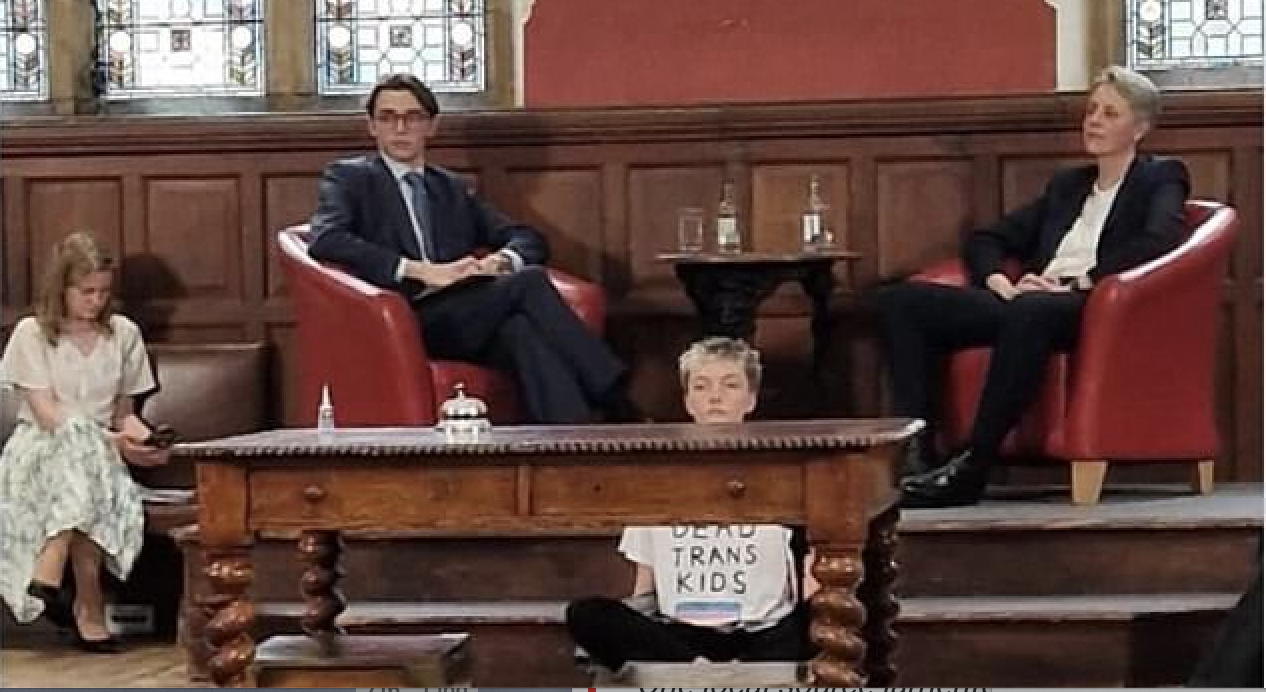Academic Free Speech
In Praise of Gender Crits
“Gender-critical” is a jargonny way of describing the ordinary views held by the vast majority of the planet’s population.

“What is feminism? Who is it for? Can men be feminists, or only allies? What is intersectionality, and must feminism be intersectional?” These are some of the questions tackled in a University of Melbourne course on the philosophy of feminism, formally designated in the university’s handbook as PHIL20046. Prospective students are informed that course content will include “a range of feminist theories, including both radical feminism and liberal feminism, and from all four ‘waves’ (with an emphasis on second wave feminism). We’ll also consider a range of applied topics like prostitution and pornography, inclusion of transwomen, theories of gender, gendered social norms, and reproductive rights.”
Content that is not included in PHIL20046, on the other hand, includes white supremacist propaganda, neo-Nazi talking points, and an approving literary exegesis of Mein Kampf. This might seem like an odd detail to note. But it is important to state for the record, given the profusion of stickers and posters recently plastered around the University of Melbourne campus, accusing the course instructor, Holly Lawford-Smith, of crafting her syllabus for the exclusive benefit of “fascists.”

Those who are familiar with the mantras of “intersectional feminism” likely won’t require an explanation for the quantum logic leap by which feminist philosophizing might be casually equated with the doctrines of Hitler, Mussolini, and Franco. But for those unschooled in such matters, the basis of complaint here is that Lawford-Smith is a “gender-critical feminist”—a term indicating one’s belief that biologically rooted differences between men and women are real; and so must be considered when marking the boundaries of female-protected spaces, such as women’s sports leagues, prisons, and domestic-violence centres.
Which is to say that “gender-critical” is a jargonny way of describing the ordinary views held by the vast majority of the planet’s population. And it speaks to the shocking extent of academia’s radicalization that Lawford-Smith’s belief in biological science would be regarded as the academic equivalent of a Nazi salute.
Gender-critical feminists trace their roots to the radical-feminism movement of the 1960s. They often focus on the pernicious effects of gender stereotypes; and critique the industries that profit from women’s pain, such as pornography. This kind of analysis focuses attention on the hardships that have historically gone along with existing as a woman. It also focuses attention on the real policy solutions required to address such hardships, including, where necessary, the maintenance of safe single-sex spaces. As one might assume, gender-critical feminists typically have little time for men who, having recently announced the discovery of some soul-like spark of womanhood within them, commence hectoring women about the imperfect nature of their intersectional feminism.
Gender crits speak their mind at their professional peril. In 2021, Kathleen Stock, a British analytic philosopher, was forced to abandon her academic position at Sussex University following a prolonged harassment campaign. Like other prominent gender-critical intellectuals, Stock is perfectly forthright about her support for the rights of trans people to live, study, and work as they please, free from discrimination and harassment—while also being equally forthright about the plain fact that transwomen are not literal women. As a consequence of expressing such (again, widely held) views, Stock was advised to install CCTV cameras in her home and to venture onto campus only when accompanied by bodyguards.
Unfortunately, this is not unusual. Some of the same activists who claim that gender crits make them feel “unsafe” in some vaguely defined metaphorical way seem to have little compunction about all-too-literally threatening the safety of “TERFs”—a term of abuse that means gender-critical—who raise their voices.

Last month, Stock delivered a talk at the Oxford Union debating society, in defiance of the hundreds of protestors who’d sought to silence her. One of them even succeeded in delaying the proceedings: Among the crimson leather chairs, mahogany tables, and other genteel old-world trappings of the Debating Chamber, a certain Riz Possnett sat glued to the floor in protest, before eventually being removed by police (to emphatic applause from the audience).

The choice of venue is worth reflecting upon. It wasn’t until 1963 that women were permitted full and equal membership in the Oxford Union. At the time, some men objected to female inclusion on the basis that women would distract the august proceedings with “chatter”; and that, instead of paying attention, the women would be “eternally occupied by nylons, high-heeled shoes, and an aura of scent.” (We are happy to report that Stock somehow managed to resist such distractions during her well-received oration.) Just six decades later, a misogynistic campaign to shut women up stirs anew, though now trafficking under the faux-progressive banner of intersectional feminism instead of traditional sexism.

Amid the protests that unfolded outside the Oxford Union debating hall, a reporter from Times Radio asked demonstrators if they’d read Stock’s 2021 book Material Girls. All of them said no. Like many self-identified progressives who seek to muzzle women, they feel themselves unencumbered by the need to engage with their opponents’ arguments, having pre-emptively defined any form of dissent as a form of de facto hate speech. “This isn’t really about freedom of speech,” one said. “This is about debating somebody’s existence.”
Such rhetoric is typical of the tired slogans that now substitute for intellectual argument in this area. By this stated view, offering objections to the housing of female prisoners with biologically male trans-identified rapists is tantamount to condemning swathes of humanity to some symbolic abyss; just as insisting on proper therapeutic safeguards before rubber-stamping a child’s demand for transition drugs and surgeries is denounced as an invitation to suicide.
This kind of ghoulish sloganeering has gotten a free pass for years within certain academic and activist subcultures. And so it should not surprise us that these same sloganeers would make the absurd suggestion that Lawford-Smith is a “fascist.” By the lights of this movement, anything less than complete ideological acquiescence signals a tendency to hum 1930s-era German marching music.
It should be said that real examples of transphobia (that much abused term) do exist in our societies. And trans people, as Lawford-Smith has argued, are owed the full gamut of legal protections enjoyed by everyone else. Certainly, no trans person should lose his or her apartment or livelihood simply on the whim of a bigoted landlord or boss. But Lawford-Smith also argues, persuasively, that it would make far more sense for such protections to be defined on the basis of a transwoman’s status as transgender (which is unassailable), as opposed to the claim of being literally female (which is not).
These are not mere word games. Last week, police officers in Ontario put the word out that a high-risk male sex offender named Shane Green had been released from prison, and is expected to repeat his practice of claiming to be trans as a means to gain access to women’s shelters. We say “his” advisedly—because, according to police, Green hasn’t even bothered taking any steps to formally self-identify as a woman; he apparently just says he’s trans so he can get at vulnerable women.

It is often seen as taboo to discuss this kind of case, on the basis that such examples may serve to wrongly stigmatize trans people as sexual predators. But the important fact about men such as Green isn’t their gender identity, but that they are criminals.
Criminals come in all colours and pronouns. What they have in common is that they will exploit any system of identification based on blind trust to prey on victims—in Green’s case, battered women seeking sanctuary from precisely this kind of male predator.
The need to safeguard against such bad-faith actors explains why our daily lives present an unending series of credential checks designed to validate that we are who we say we are—from ATMs, to airport check-ins, to voting booths, to logging on to social media and email. It is only in the narrow area of gender identity—and even here, only recently—wherein it is demanded that the good faith and honesty of complete strangers be simply assumed. This is how we got to a place where an orthodox campus feminist is now someone who demands that Shane Green must be admitted to women’s spaces upon his say-so as a “woman”—while those who point out the dangerous absurdity of that position get smeared as fascists.
The demonization of Lawford-Smith did not arise in a vacuum, and so can’t be dismissed as the work of grass-roots fanatics. After she’d attended the Let Women Speak rally earlier this year, her boss, Melbourne University’s Dean of Arts, sent out a mass email to staff and students condemning the protest as “dehumanizing” and “antithetical to my own values and to the values of our university.” In a complaint to Worksafe Victoria, the state’s workplace safety regulator, Lawford-Smith has alleged that this email encouraged the student campaign of intimidation against her.

Regardless of the outcome of her complaint, it is worth noting which way the power gradient tilts here. The campaign to shut up women such as Lawford-Smith is led by activists who regularly present themselves as underdogs championing a small, vulnerable, and beleaguered constituency. This characterization was accurate a few decades ago, when the trans-rights movement was in its infancy. By contrast, the modern reality, of which the University of Melbourne offers a microcosm, is that of a radicalized minority successfully pressuring some of the most powerful members of our societies—including not only university deans, but also politicians, CEOs, and journalists—to enforce a fantasy-based understanding of the human condition.
It’s uncertain how long this activist minority can continue enforcing its orthodoxy on those around them. But the ultimate outcome isn’t in doubt: As Philip K. Dick put it, “reality is that which, when you stop believing in it, doesn’t go away.” And that reality is encoded not in our pronouns, but in our chromosomes.









